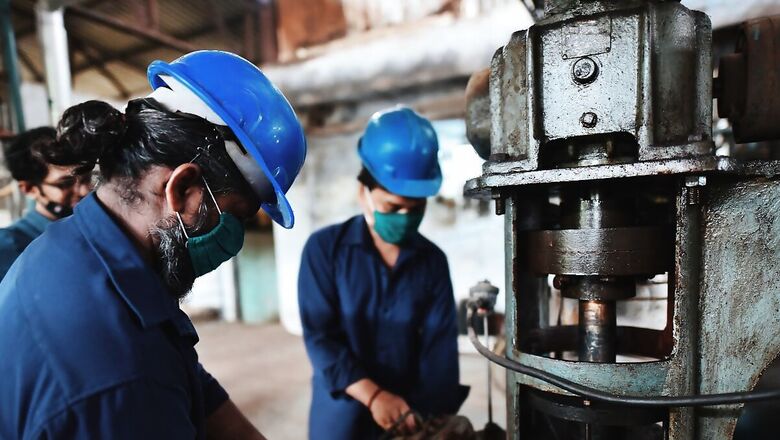
views
One of the most talked-about issues during the 2024 Lok Sabha elections has been jobs, a crucial concern of the country’s young population. Reflecting this focus, a report on the hiring trends for May 2024 was released by a talent platform called ‘foundit’, offering valuable insights to guide the youth towards prospective sectors.
According to the report, the overall hiring index has increased from 265 in May 2023 to 295 in May 2024, marking an 11% annual surge in e-recruitment activities. The last three months (March-May 2024) also saw a 7% increase in hiring.
Tier-2 vs Metro Cities
Tier-2 cities such as Kochi, Coimbatore, and Jaipur have emerged as key hiring locations, showing consistent growth, while in metropolitan areas, Kolkata and Delhi/NCR are leading hiring hubs.
The report revealed that the production and manufacturing sector experienced a remarkable 47% annual hiring growth, becoming the top hiring sector in tier-2 cities. This sector saw a 29% year-on-year growth in tier-2 cities compared to 5% in metro cities. This sector’s growth was fuelled by various factors such as government initiatives, infrastructure development, and favourable policies.
In terms of top hiring industries, real estate saw an 8% increase in tier-2 cities and 1% in metro areas. Engineering and construction witnessed a 5% increase in tier-2 regions and 4 % increase in metro cities.
The education sector witnessed an 8% rise in tier-2 cities but a 4% decline in metros. Meanwhile, IT, software and services showed a 17% increase in tier-2 cities versus a 3% rise in metro cities. Conversely, advertising, market research, and public relations faced a 4 % decline in tier-2 cities but grew by 3% in metro areas. However, travel and tourism declined by 2 % in tier-2 cities but increased by 10% in metros.
Industry-Specific Growth
The growth of the production and manufacturing sector (47%), extended to related industries, with home appliances and electrical components seeing a 35% rise in hiring. The telecom/ISP sector also saw notable growth, recording a 9% year-on-year increase due to heightened investments and the expansion of services such as IoT, cloud computing and 5G technology. The report also noted that the healthcare industry experienced a 29 % year-on-year increase and a 4% monthly increase in hiring.
However, some sectors like the agro-based industries, shipping/marine, FMCG, and import/export saw a significant yearly downtrend in hiring. Meanwhile, retail and oil/gas/petroleum industries showed moderate growth, with increases of 18% and 22%, respectively
Job Roles
The growing popularity of digital and social media marketing has led to a month-on-month surge in demand for arts/creative professionals, particularly graphic designers and animators, with a 4% increase. Marketing and communication specialists also recorded a 16% year-on-year increase in hiring.
On the other hand, customer service roles faced a 25 % decline due to the adoption of AI-based chatbots and virtual assistants. However, hospitality and travel roles saw a 23% year-on-year increase and a 1% monthly increase from April 2024 to May 2024. Additionally, software, hardware, and telecom professionals experienced an 11% increase in hiring, primarily in metropolitan areas focused on skill-based recruitment.
It should be noted that the demand for mid-senior level professionals with 7 to 10 years of experience grew by 9% year-on-year, while senior-level professionals with more than 15 years of experience saw a 17% increase. Hiring for associate roles with 4-6 years of experience grew by 2% both over the last month and annually.
Salary Trends
The average minimum salary in metro cities ranges from Rs 4.83 lakh per annum (LPA) to Rs 6.63 LPA, while the average maximum salary ranges between Rs 8.09 LPA to Rs 15.98 LPA. In tier-2 cities, the average minimum salary ranges from Rs 4.01 LPA to Rs 5.43 LPA, and the average maximum salary ranges from Rs 7.12 LPA to Rs 11.01 LPA.
For example, in the financial capital of the country, Mumbai, the average minimum salary is Rs 6.21 LPA, and the average maximum salary is Rs 15.98 LPA. In Bangalore, these figures are Rs 6.63 LPA and Rs 15.22 LPA, respectively. Delhi-NCR offers an average minimum salary of Rs 5.58 LPA and a maximum of Rs 13.07 LPA.
As per the findings, in Hyderabad, the average minimum salary is Rs 6.57 LPA, with a maximum of Rs 11.82 LPA. Chennai has an average minimum salary of Rs 6.16 LPA and a maximum of Rs 11.03 LPA. Pune offers an average minimum of Rs 5.43 LPA and a maximum of Rs 11.01 LPA. Kolkata, on the other hand, has an average minimum salary of Rs 4.94 LPA and a maximum of Rs 9.82 LPA.
In other cities like Coimbatore, the average minimum salary is Rs 4.12 LPA, with a maximum of Rs 8.20 LPA. Ahmedabad offers an average minimum of Rs 4.83 LPA and a maximum of Rs 8.09 LPA. Kochi’s average minimum salary is Rs 4.06 LPA, with a maximum of Rs 7.16 LPA. Jaipur has an average minimum of Rs 4.01 LPA and a maximum of Rs 7.88 LPA. In Chandigarh, the average minimum salary is Rs 4.26 LPA, and the maximum is Rs 7.13 LPA. Vadodara offers an average minimum of Rs 4.13 LPA and a maximum of Rs 7.12 LPA.

















Comments
0 comment